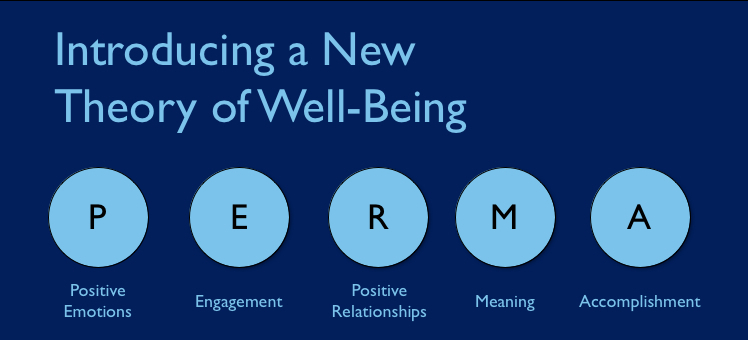
Martin Seligman, a leader of the positive psychology movement and author of “Authentic Happiness,” now advocates for a view of our lives that goes deeper than whether we’re smiling.
In an article in Whole Living magazine, Seligman spelled out his PERMA equation and suggested some ways to flourish in life:
- Positive emotion – Seligman notably doesn’t use the work happiness here, so I think he wanted to broaden the scope of feelings covered. You can feel the warm glow of love even as you’re sobbing on a sad day, for example. Since it’s tempting to dwell on the negative rather than the positive, Seligman encourages spending time each day to reflect on good things that happened that day to foster the positive.
- Engagement – if you’ve ever lost track of time doing something you love, some people call that being in flow. But we all have tasks we dislike, so he suggests finding a way to blend something you love with something you don’t. Listen to your favorite music while you do the dishes or invite a friend to exercise with you, for example.
- Relationships – Seligman called our human connections “the best antidote to the downs of life and the single most reliable up.” And yet I see so many people putting their relationships last on their priority list. They’re too busy with work, the kids, the commute, errands, whatever, to make time for family and friends. I have a couple of friends who are insanely busy and yet often make time to call or email, which inspires me to feel if they can do it, I surely can.
- Meaning – most of us need something more than simply getting a paycheck to feel inspired to get out of bed every morning. Sure, it’s great to pay the rent, but feeling that what we do matters to society, or our customers, or to our colleagues contributes to our sense of purpose. Parenting or volunteering seem like obvious fits for this connection to a larger meaning than our selfish needs.
- Accomplishment – years ago, I interviewed a researcher who explained how much humans crave a sense of mastery. We like to feel good at stuff. But sometimes to get good at something, we have to spend a fair amount of time being bad at it, and if you just look at life through the lens of pursuit of happiness, that might lead to quitting anything you aren’t good at. Instead, Seligman talks about being willing to endure short-term unhappiness – dieting when you want chocolate cake, working on a home project when you’d rather go to the movies – in pursuit of the deferred gratification of accomplishment.
[youtube=http://www.youtube.com/watch?v=4C513ywEBho]
How does this line up with Deepak Chopra’s formula for happiness, which I blogged about recently?
Chopra says H = S + C + V. H is for happiness. S is the “set point” of the brain, says Chopra, which is “basically attitude.” C is conditions of living, mostly referring to physical conditions. V is voluntary choices that you make.
Do you agree with these definitions of what makes us happy or makes us flourish? Which of these understandings of well being rings true for you? What are you doing to move yourself forward on any of these measures?


2 Comments
Leave a reply